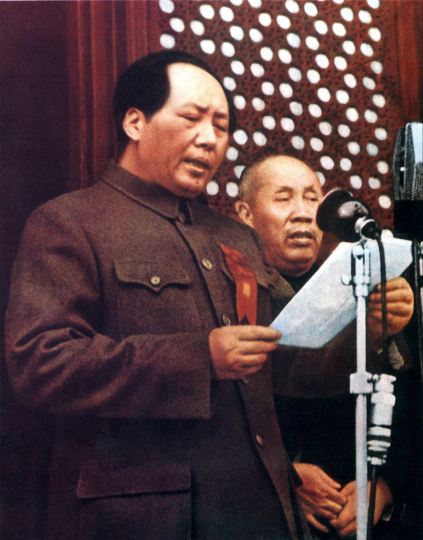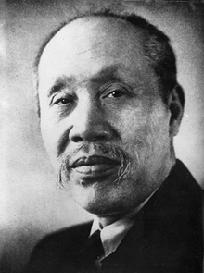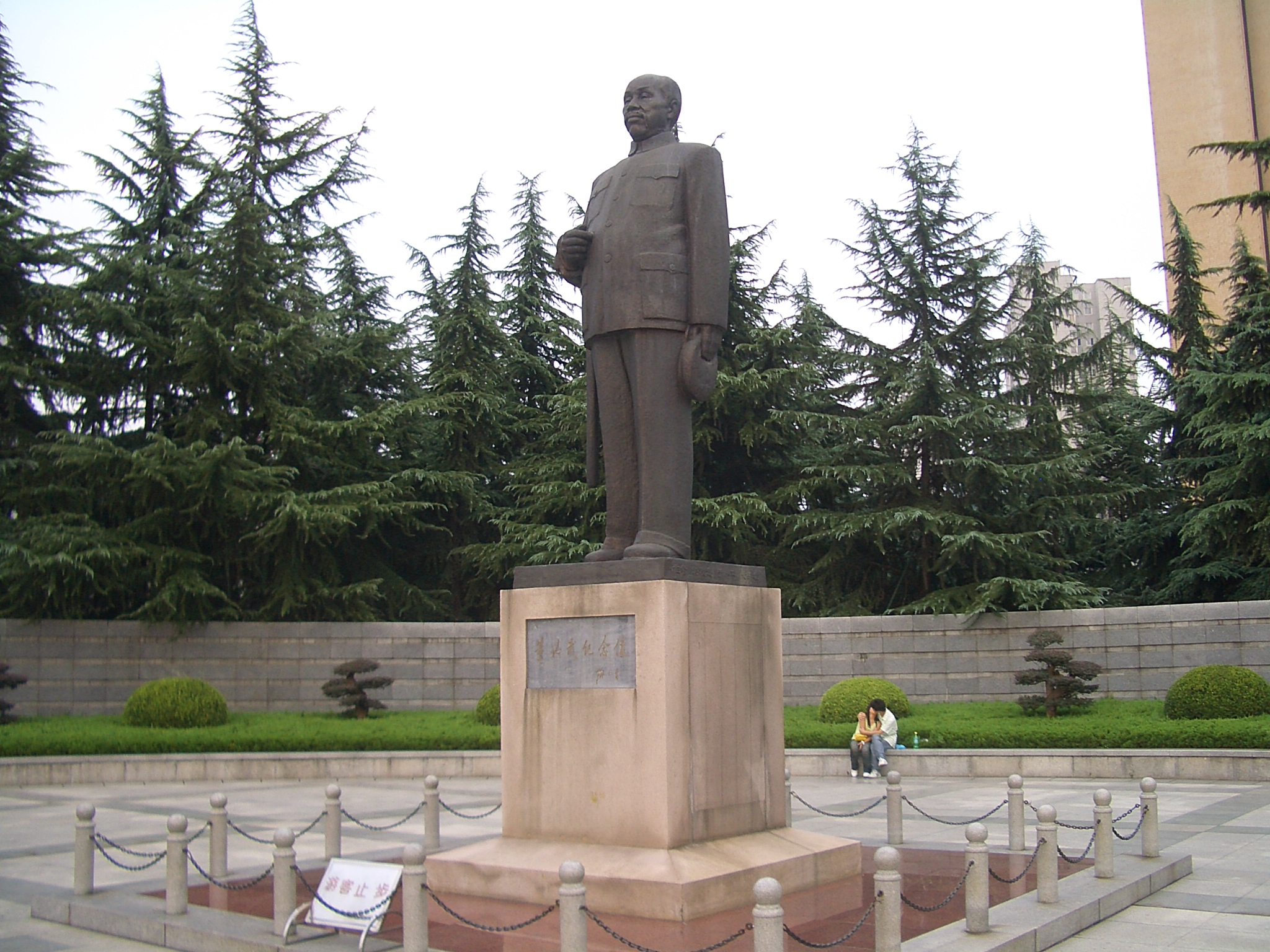1. Overview
Dong Biwu (董必武Dǒng BìwǔChinese) (March 5, 1886 - April 2, 1975) was a prominent Chinese communist revolutionary and politician who played a pivotal role in the founding of the Chinese Communist Party (CCP) and the establishment of the People's Republic of China (PRC). He was one of the few individuals, alongside Mao Zedong, to be present at both the inaugural congress of the CCP in 1921 and the proclamation ceremony of the PRC in 1949. Throughout his extensive career, Dong held numerous significant positions, including Vice President of China and later as Acting Chairman of the People's Republic of China from 1972 to 1975. He was also instrumental in laying the groundwork for China's socialist legal system, earning recognition as a "great Marxist, an outstanding proletarian revolutionary, a founding father of the People's Republic of China," and a "founder of China's socialist legal system."
2. Early Life and Education
Dong Biwu's early life was shaped by a traditional Chinese upbringing and a burgeoning interest in revolutionary ideals, which led him to pursue legal studies and engage in early anti-imperialist movements.
2.1. Birth and Upbringing
Dong Biwu was born on March 5, 1886, in Huanggang, Hubei, which was then known as Huang'an County. He came from a landlord family and received a classical education, a common practice for individuals of his social standing during that era. In 1903, he successfully passed the Xiu Cai examination, a traditional scholar degree, and later, in 1910, he worked as a teacher in Guangzhou.
2.2. Study in Japan and Early Revolutionary Activities
In 1911, Dong Biwu joined the Tongmenghui, a revolutionary alliance, and actively participated in the Wuchang Uprising, a key event in the Xinhai Revolution that led to the overthrow of the Qing Dynasty. Following these events, he traveled to Japan twice to pursue law studies at Nihon University. During his time in Japan in 1913, he joined Sun Yat-sen's newly formed Chinese Revolutionary Party, which later evolved into the Kuomintang.
Upon his return to China in 1915, Dong organized resistance against the Yuan Shikai regime in his native Hubei, leading to his imprisonment for six months. After his release, he again went to Japan to complete his legal education. Between 1919 and 1920, he resided in Shanghai, where he was first introduced to Marxism through a group of Communist intellectuals, notably centered around Li Hanjun. In 1919, he also participated in the May Fourth Movement in Shanghai and taught Chinese at a middle school in Wuhan.
3. Revolutionary Career
Dong Biwu's revolutionary career saw him transition from an early nationalist to a committed Marxist, playing a crucial role in the formation and development of the Chinese Communist Party through its most challenging periods.
3.1. Exposure to Marxism and Party Founding
Dong Biwu's exposure to Marxist thought in Shanghai between 1919 and 1920 profoundly influenced his ideological development. He quickly embraced these new ideas and, in 1920, became an early member of the Communist Party in Wuhan. His commitment to the burgeoning communist movement led him to represent the Wuhan region, alongside Chen Tanqiu, at the 1st National Congress of the Chinese Communist Party in July 1921. Following the congress, he took on significant responsibilities, including establishing party organizations in Hubei, serving as a member of the Wuhan area committee, the Hubei provincial committee, and as the minister of the Hubei militia.
3.2. Education in the Soviet Union
After the Nanchang Uprising in 1927, as tensions escalated between the Kuomintang and the Communist Party, Dong Biwu was forced into hiding. He sought refuge in Kyoto, Japan, for eight months before making his way to the Soviet Union. There, between 1928 and 1931, he pursued advanced studies at the International Lenin School and Moscow Sun Yat-sen University, where he deepened his theoretical understanding of Marxism-Leninism and revolutionary strategy. He earned a Master of Law degree from Moscow Sun Yat-sen University in 1932.
3.3. Long March and Yan'an Period
Upon his return to China in 1932, Dong Biwu became actively involved in the Jiangxi Soviet, serving as the Political Director of the Red Army Academy and President of the Party School. He was a participant in the epic Long March, a strategic retreat by the Red Army, and upon their arrival in Yan'an, he resumed his duties in school leadership. During this period, Dong was recognized as one of the Five Elders of Yan'an (延安五老Chinese), a group of respected senior revolutionaries, alongside Lin Boqu, Xu Teli, Wu Yuzhang, and Xie Juezai. He also held the position of Vice Chairman of the Shaan-Gan-Ning Border Region government.
4. Career in the People's Republic of China
Following the establishment of the People's Republic of China, Dong Biwu assumed crucial governmental, judicial, and leadership roles, contributing significantly to the foundational state-building efforts and the development of its legal and political systems.

4.1. Early PRC Government Roles
After the founding of the People's Republic of China in 1949, Dong Biwu held several key positions in the new government. He served as the Director of the Finance and Economic Committee of the Government Council. From October 19, 1949, to September 27, 1954, he was also the Vice Premier of the Government Administration Council (later the State Council). Additionally, he served as the Minister of Finance of the Central Party, Secretary of the North China Bureau, and Vice Chairman of the North China People's Government, highlighting his involvement in the initial foundational period of the PRC.
4.2. President of the Supreme People's Court
In 1954, Dong Biwu was appointed President of the Supreme People's Court, a position he held until April 1959. During his tenure, he undertook foundational work in establishing and shaping China's socialist legal system, emphasizing the principles of order and justice. In 1958, during his two-month absence from Beijing for a diplomatic mission, the work of the Supreme People's Court over the preceding years was reviewed by a group led by Peng Zhen. Upon his return, Dong was presented with the shortcomings revealed by this scrutiny and accepted responsibility for them at a special judicial conference.
4.3. Vice President and Acting President
In early 1959, Dong Biwu was appointed Vice President of China in a joint capacity with Soong Ching-ling, a post he held until his death in 1975. Following the downfall of Liu Shaoqi in 1968 and the subsequent power vacuum after Lin Biao's demise, Dong became the Acting President of China (Chairman of the People's Republic of China), serving in this capacity from February 1972 to January 1975. During this critical transitional period, he managed state affairs and represented the nation. In January 1975, the office of president was formally abolished, and the Chairman of the Standing Committee of the National People's Congress, then Zhu De, became the formal head of state. Dong was subsequently elected Vice Chairman of the Standing Committee of the National People's Congress.
5. International Activities
Dong Biwu played a significant role in China's early engagement with the global community, participating in key international forums and leading diplomatic missions to foster international understanding and alliances.
5.1. United Nations and US Visit
In 1945, Dong Biwu traveled to San Francisco to attend the founding session of the United Nations. He was part of a delegation led by T.V. Soong and was the sole representative of the Communist Party. The CCP Central Committee outlined the objectives of his trip as: "to win foreign friends, to improve the party's international position, and to try to stay and work in the United States." After the conference, Dong spent several months traveling across the United States, actively pursuing these diplomatic goals. Upon his death, United Nations Secretary-General Kurt Waldheim offered condolences, referring to Dong as "One of the founders of the United Nations."
5.2. Diplomatic Missions
Dong Biwu's experience in international diplomacy, particularly from his 1945 visit to the United States, made him a suitable choice to lead further delegations. In 1958, he led a delegation to Eastern Europe and the Soviet Union, a mission that kept him away from Beijing for two months. These missions highlighted his efforts in building international alliances and representing China's foreign policy objectives during the early years of the People's Republic of China.
6. Ideological and Legal Contributions
Dong Biwu's intellectual journey from classical education to a deep commitment to Marxism shaped his significant contributions to China's governance, particularly in the foundational development of its socialist legal framework.
His early exposure to Marxism in Shanghai and subsequent advanced studies at the International Lenin School and Moscow Sun Yat-sen University solidified his ideological convictions. He was consistently described as a "great Marxist" in official capacities.
As President of the Supreme People's Court from 1954 to 1959, Dong Biwu was instrumental in establishing and shaping China's socialist legal system. His work in this role laid crucial groundwork for the nation's legal framework, contributing to social order and governance in the newly established People's Republic. He was officially recognized as "a founder of China's socialist legal system." His writings, including "Dong Biwu's Collected Works," "Dong Biwu's Politics and Law," and "Dong Biwu's Poetry Collection," further reflect his intellectual engagement with political and legal theory.
7. Personal Life
Dong Biwu was born into a landlord family in Huanggang, Hubei. Despite his relatively privileged background, he remained a steadfast figure within the Chinese Communist Party, even during tumultuous periods like the Cultural Revolution. Historians have noted his special and consistently positive relationship with Mao Zedong, which is believed to have contributed to his ability to navigate complex political landscapes. Publicly known aspects of his personal life primarily revolve around his long and dedicated career in public service.
8. Death
Dong Biwu died in Beijing on April 2, 1975, at the age of 89. His passing occurred one year before that of Mao Zedong and several other key figures in Chinese politics.
9. Assessment and Legacy
Dong Biwu's life and career represent a significant chapter in the history of modern China. His enduring presence from the earliest days of the Chinese Communist Party to the establishment and initial decades of the People's Republic of China underscores his profound impact on the nation's development and governance.
9.1. Positive Contributions
Dong Biwu is widely recognized as one of the original founding members of the Chinese Communist Party, a testament to his early dedication to revolutionary ideals. His consistent presence and leadership from the Party's inception in 1921 to the proclamation of the People's Republic of China in 1949, a distinction shared only with Mao Zedong, highlights his foundational role. He was instrumental in establishing the Party's organizational structures in Hubei and played a crucial role in educational institutions during the Yan'an period, where he was revered as one of the 'Five Elders of Yan'an'.
Following the establishment of the PRC, Dong made significant contributions to state administration and the development of China's legal system. His tenure as President of the Supreme People's Court was foundational in shaping the socialist legal framework, emphasizing stability and order. He held various high-level governmental and leadership positions, including Vice Premier, Vice President, and Acting President, demonstrating his commitment to state-building and governance. His ability to navigate complex political struggles, such as defending Peng Dehuai at the Lushan Conference while maintaining favor with Mao, further illustrates his political acumen and his dedication to the Party's long-term objectives.
9.2. Historical Evaluation and Criticism
Dong Biwu's career is inextricably linked to the rise and consolidation of the Chinese Communist Party's power. While his contributions to the establishment of the PRC and its legal system are undeniable, his consistent role within the Party structure also places him within the context of a political system that evolved into a one-party state. His ability to remain unaffected by the severe political turmoil of the Cultural Revolution, and even rise in prominence during that period, reflects his deep integration into the Party's hierarchy and his unique relationship with Mao Zedong. This longevity and political resilience, while a testament to his personal standing, also highlight the nature of the regime he helped build and sustain, which suppressed dissent and centralized power. Historical interpretations of his actions and affiliations are thus viewed within the broader context of the CCP's governance, acknowledging his pragmatic contributions to state administration while also recognizing the implications of his role in a system that prioritized Party control over democratic pluralism.
10. Influence
Dong Biwu's work and ideas left a lasting impact on the development of Chinese politics, law, and society. As a founding member of the CCP who remained a high-ranking official throughout the early decades of the PRC, his stability and consistent presence provided continuity within the Party leadership. His role as a "founder of China's socialist legal system" established a framework that continues to influence Chinese jurisprudence. His political resilience and ability to navigate internal party struggles, particularly his unique relationship with Mao Zedong, set a precedent for political survival and influence within the Party. The various works he authored on politics and law further contributed to the ideological and theoretical underpinnings of the Chinese state, shaping subsequent policies and institutions.
11. Commemoration
Dong Biwu's legacy is preserved and honored in various ways across China. In 1991, a statue of Dong Biwu was erected in Hongshan Guangchang, one of the central squares in Wuhan, commemorating his contributions. The Hubei Provincial Museum houses a dedicated collection of his personal items, offering insights into his life and work. Furthermore, his literary contributions are remembered through the publication of his "Poetry Selection" in 1977, and his centennial was marked by the issuance of a commemorative stamp in 1986.

